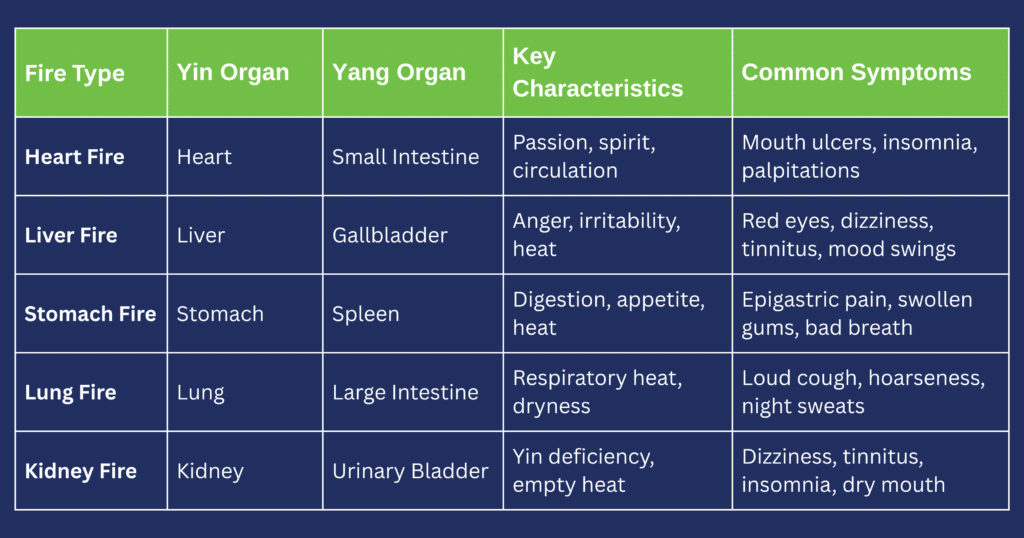The Five Fires in Chinese Medicine: Understanding Their Role in Wellness and Healing
In Traditional Chinese Medicine (TCM), the concept of Fire transcends the simple idea of heat or flame. It represents a dynamic, vital force—warmth, activity, and upward movement—that fuels life itself. Fire embodies transformation and passion, symbolizing the peak of energy within the natural cycle of the body and the seasons. Ancient texts like the Huangdi Neijing and 尚書 (Shang Shu) describe Fire as an essential element that must remain balanced for health and harmony to flourish.
Fire’s nature is inherently Yang—active, bright, and expansive—yet it must be held in check by Yin to prevent imbalance. When Fire becomes excessive or deficient, it can manifest as physical symptoms or emotional disturbances, reflecting disharmony within the body’s internal systems. Understanding Fire’s role within the Five Element Theory is crucial because it ties together not only physical organs but also emotions, mental states, and environmental influences, offering a holistic view of health.
The Five Fires in Chinese Medicine: Understanding Their Role in Wellness and Healing
In Traditional Chinese Medicine (TCM), the concept of Fire transcends the simple idea of heat or flame. It represents a dynamic, vital force—warmth, activity, and upward movement—that fuels life itself. Fire embodies transformation and passion, symbolizing the peak of energy within the natural cycle of the body and the seasons. Ancient texts like the Huangdi Neijing and 尚書 (Shang Shu) describe Fire as an essential element that must remain balanced for health and harmony to flourish.
Fire’s nature is inherently Yang—active, bright, and expansive—yet it must be held in check by Yin to prevent imbalance. When Fire becomes excessive or deficient, it can manifest as physical symptoms or emotional disturbances, reflecting disharmony within the body’s internal systems. Understanding Fire’s role within the Five Element Theory is crucial because it ties together not only physical organs but also emotions, mental states, and environmental influences, offering a holistic view of health.
Key Takeaways
- The Five Fires in Chinese Medicine—Heart, Liver, Stomach, Lung, and Kidney Fire—represent distinct internal imbalances affecting both body and mind.
- Fire imbalances can cause symptoms like insomnia, irritability, dry mouth, and digestive issues depending on the organ involved.
- Acupuncture and herbal medicine help regulate Fire energy, clearing excess heat or nourishing Yin to restore balance.
- Lifestyle changes and cooling foods like watermelon, cucumber, and mung beans support Fire harmony and prevent flare-ups.
The Five Types of Fire in Chinese Medicine
Within TCM, Fire is not a singular entity but manifests in five distinct forms, each linked to specific organs and energetic functions. These are Heart Fire, Liver Fire, Stomach Fire, Lung Fire, and Kidney Fire. Each “fire” has unique characteristics, causes, and clinical implications, reflecting the complex interplay of physiology and emotion.
Heart Fire
The Heart is often called the “Emperor” of the body in TCM, governing not only blood circulation but also the spirit (Shen). When Heart Fire flares, it can be triggered by excessive joy, emotional stress, or even diet—think spicy foods or hot weather. Symptoms typically include insomnia, restlessness, palpitations, and painful mouth ulcers.
Heart Fire can present in two ways: as a full, exuberant fire with intense heat signs, or as a more subtle Yin deficiency fire, where the heat is more internal and chronic. The emotional toll is significant—patients may feel anxious, irritable, and disconnected from restful sleep. This fire is closely tied to our ability to experience joy and maintain emotional balance.
Liver Fire
Liver Fire is strongly linked to emotional stress, particularly anger and frustration, which can ignite this internal flame. Seasonal changes, especially the spring wind-heat, often exacerbate Liver Fire. It manifests with symptoms like red, bloodshot eyes, dizziness, tinnitus, and a dry throat. Women, especially as they age, may be more prone to this imbalance.
Emotionally, Liver Fire can cause irritability, mood swings, and sudden outbursts of anger. This fire disrupts the smooth flow of Qi, leading to both physical and psychological discomfort. Understanding and calming Liver Fire is essential for emotional regulation and overall well-being.
Stomach Fire
Stomach Fire often arises from poor dietary habits—excessive spicy, greasy, or rich foods—or from Liver Fire invading the stomach. It creates intense heat in the digestive system, causing epigastric pain, swollen gums, bad breath, and excessive hunger. The tongue may show a thick yellow coating, a classic sign of internal heat.
This fire disrupts digestion and appetite regulation, leading to discomfort and sometimes more serious gastrointestinal issues. Stomach Fire reminds us how closely our diet and emotions are intertwined in maintaining internal balance.
Lung Fire
Lung Fire is less common but can develop from external pathogens like wind-cold that transform into heat or from a constitution prone to heat retention. Symptoms include a loud, dry cough, shortness of breath, hoarseness, and night sweats. Weight loss may occur if the fire persists.
This fire affects respiratory health and immune function, often causing dryness and inflammation in the lungs. It highlights the vulnerability of the respiratory system to both environmental and internal imbalances.
Kidney Fire
Unlike the other fires, Kidney Fire is typically an empty fire, meaning it arises from Yin deficiency rather than excess Yang. It manifests as symptoms such as dizziness, tinnitus, insomnia, nocturnal emissions, and dry mouth. Kidney Fire reflects the depletion of the body’s foundational energy and fluids. Nourishing Kidney Yin is critical to calming this fire. This fire’s subtlety often makes it harder to detect, yet its impact on vitality and longevity is profound.
Fire Element in the Five Element Theory
Fire holds a unique position among the Five Elements—Wood, Fire, Earth, Metal, and Water—as the element of transformation and peak energy. It corresponds to the summer season, when nature is in full bloom and energy is at its height. Fire governs the Heart and Small Intestine, organs responsible for circulation, spirit, and digestion.
Emotionally, Fire is associated with joy, passion, and enthusiasm, fostering social connection and communication. Its sound is laughter, a natural expression of happiness and vitality. When balanced, Fire fuels warmth and connection; when out of balance, it can lead to emotional volatility or detachment.
Emotional and Psychological Aspects of Fire
Fire’s influence on the mind and spirit is profound. The Heart, as the “house of the spirit,” governs mental clarity, emotional stability, and social engagement. When Fire is balanced, we experience joy, warmth, and meaningful relationships.
However, Fire imbalance can manifest as anxiety, restlessness, inappropriate laughter, or irritability. These emotional symptoms often precede or accompany physical signs, underscoring the inseparable link between body and mind in TCM.
Causes and Triggers of Fire Imbalances
Fire imbalances arise from a variety of internal and external factors:
- Internal causes: Emotional stress, excessive joy or anger, poor diet (spicy, greasy foods), overwork, and lack of rest.
- External causes: Seasonal heat, environmental factors, infections, and exposure to heat or sun.
- Yin-Yang imbalance: Excess Yang or Yin deficiency disrupts the natural flow of energy, leading to Fire syndromes.
Recognizing these triggers can empower patients to make lifestyle adjustments that prevent or reduce Fire-related imbalances.
Treatment and Management of Fire Imbalances in TCM
TCM offers a rich toolkit for addressing Fire imbalances, combining acupuncture, herbal medicine, and lifestyle interventions.
Acupuncture
Targeted acupuncture points can clear excess Fire or nourish Yin to calm deficient Fire. For example:
- Heart Fire: Points like HT7 (Shenmen) and PC6 (Neiguan) soothe the spirit and reduce heat.
- Liver Fire: LR2 (Xingjian) and GB43 (Xiaxi) help clear Liver heat.
- Stomach Fire: ST44 (Neiting) and LI11 (Quchi) cool the digestive system.
- Lung Fire: LU5 (Chize) and LU10 (Yuji) clear Lung heat.
- Kidney Fire: KI3 (Taixi) and KI6 (Zhaohai) nourish Kidney Yin.
Herbal Medicine
Herbs are selected based on the fire type and underlying imbalance:
- Cooling herbs such as huang lian and zhi mu clear heat.
- Yin-nourishing herbs like mai men dong and shu di huang replenish fluids and calm empty fire.
Lifestyle Recommendations
- Diet: Emphasize cooling foods (cucumbers, watermelon, mung beans), avoid spicy, greasy, or fried foods.
- Hydration: Adequate water intake supports Yin and prevents dryness.
- Stress Management: Meditation, qigong, yoga, and breathing exercises help regulate emotions and soothe Fire.
- Environmental Care: Avoid excessive sun exposure and overheating.
Practical Tips for Balancing Fire in Daily Life
Awareness is the first step to balance. Watch for early signs like irritability, dry mouth, or restless sleep. Aligning self-care with the seasons—especially summer—can enhance Fire harmony.
Emotional regulation is vital. Techniques such as journaling, mindful breathing, and gentle movement can prevent Liver and Heart Fire flare-ups. Prioritizing rest and balanced activity maintains the delicate equilibrium between Yin and Yang Fire.
Integrating Modern Science and TCM Fire Theory
Emerging research supports the efficacy of acupuncture and herbal therapies in modulating inflammatory markers and neurochemical pathways linked to Fire imbalances. Studies show acupuncture’s role in reducing anxiety and improving sleep, aligning with TCM’s understanding of Heart Fire.
Neurobiological effects of Fire element balancing therapies may include regulation of the autonomic nervous system and stress hormone levels, bridging ancient wisdom with modern medicine. This integrative approach enhances patient outcomes and broadens acceptance of TCM in contemporary healthcare.
Why Understanding the Five Fires in Chinese Medicine Is Key to Holistic Health and Wellness
The Five Fires in Chinese Medicine offer a profound framework for understanding the intricate connections between our physical health, emotions, and environment. By recognizing the unique characteristics of each Fire and their impact on the body and mind, we can take proactive steps toward balance and vitality.
At ACA Acupuncture & Wellness, we are dedicated to guiding you through this journey with compassionate care and integrative expertise. Together, we can harness the transformative power of Fire to nurture your well-being in body, mind, and spirit.
Source:
Mayer, B. A. (2023, July 14). The five elements: What science has to say about this Chinese medicine theory. Healthline. https://www.healthline.com/health/mind-body/what-are-the-five-elements
Frequently Asked Questions
What is the five element fire?
Fire is one of the five fundamental elements in Traditional Chinese Medicine, symbolizing warmth, transformation, and peak energy. It governs the heart and small intestine, playing a vital role in circulation and digestion. Emotionally, Fire is associated with joy, passion, and the spark of life.
What are the symptoms of fire element imbalance?
Imbalances in the Fire element can manifest as insomnia, irritability, and mouth ulcers. Other common signs include red eyes, dry mouth, restlessness, and digestive discomfort. The specific symptoms vary depending on which Fire—Heart, Liver, Stomach, Lung, or Kidney—is affected.
What does fire represent in Chinese medicine?
In Chinese medicine, Fire represents warmth, activity, and transformation. It is closely linked to the summer season and the heart’s spirit, reflecting emotional joy and vitality. Fire symbolizes the peak of energy and connection in both body and mind.
How to balance fire element in TCM?
Balancing the Fire element involves a combination of acupuncture and herbal medicine tailored to clear excess heat or nourish Yin deficiency. Dietary adjustments focusing on cooling foods help regulate internal heat. Additionally, stress management and lifestyle changes support the harmonious flow of Fire energy.
Is fire yin or yang?
Fire is primarily a Yang element, characterized by heat, activity, and upward movement. However, it depends on Yin to provide balance and prevent excessive heat or agitation. Without Yin, Fire can become overwhelming and cause disharmony.
What foods are good for the fire element?
Cooling foods such as watermelon, cucumber, mung beans, and leafy greens help soothe and balance the Fire element. It is best to limit spicy, greasy, and fried foods that can exacerbate internal heat. Proper diet supports Fire’s vitality while preventing excess.
Contact ACA Acupuncture & Wellness
Get in Touch
Newsletter Sign Up
LOCATIONS
MANHATTAN
QUEENS
NEW JERSEY
CALIFORNIA

ACA Franchise Opportunities
The over $4 billion US acupuncture market offers a great opportunity with over 10% annual growth rates and a continuing flow of new patients interested in the benefits of acupuncture.






